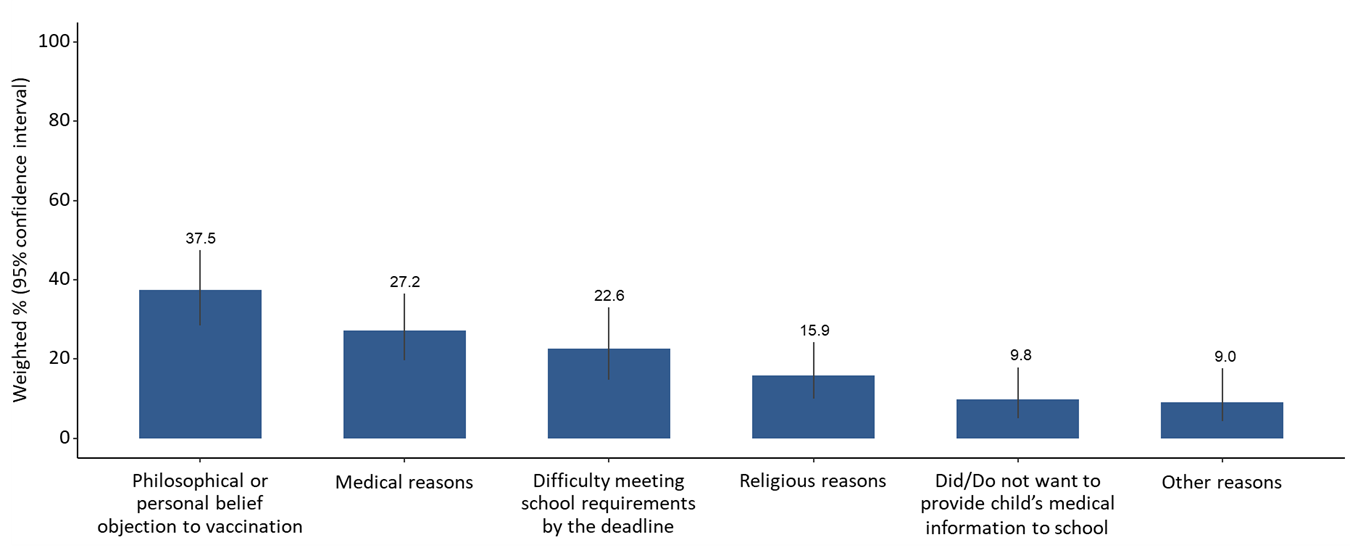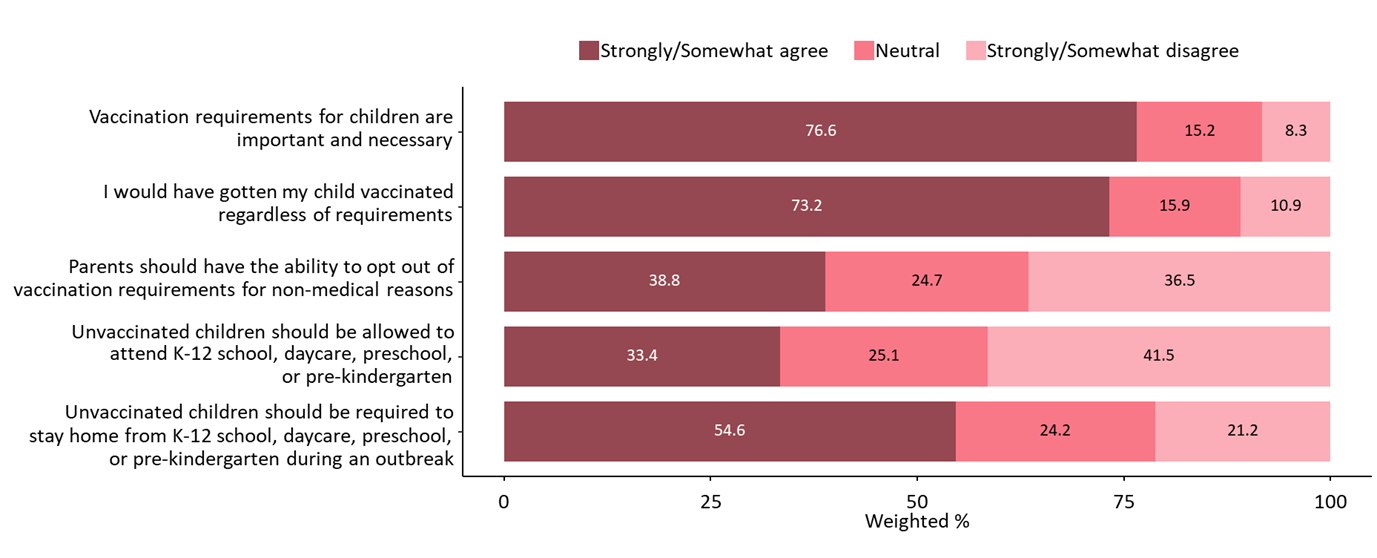At a glance
Summary
Vaccination requirements to attend school and daycare are an important strategy for maintaining high vaccination coverage among children. However, parent-requested exemptions from vaccines required for school and daycare entry have increased and coverage with required vaccines has decreased since the COVID-19 pandemicA, possibly due to an increase in vaccine hesitancy. Though some children with an exemption eventually receive the required vaccines, many do not. Assessing reasons for obtaining an exemption can help eliminate barriers to vaccination and develop strategies to encourage parents to get their children vaccinated.
CDC surveyed parents in June–July 2024 to assess attitudes toward and experiences with vaccination requirements and exemptions and knowledge about the vaccines required or recommended for their children. The most common reason reported for seeking an exemption was philosophical or personal belief objection to vaccination (37.5%). Difficulty meeting school requirements by the deadline was reported as a reason for exemption by 22.6% of parents. Though most (76.6%) parents supported vaccination requirements for school and daycare attendance, 8.3% of all parents/guardians disagreed that vaccination requirements are important and necessary, 33.4% agreed that unvaccinated children should be allowed to attend school or daycare, and 21.2% disagreed that unvaccinated children should have to stay home during a disease outbreak.
Reasons for exemption
The most common parental reason for obtaining or planning to obtain an exemption for their child was philosophical or personal belief objection to vaccination.
Among surveyed parents of children aged 6 months–17 years in the United States whose child attended school or daycare in 2023–24 or will attend in 2024–25 (N=1,835), 3.8% have obtained an exemption from vaccinations required for attendance in the past and 3.7% plan to obtain one. Of these parents, 37.5% reported philosophical or personal belief objections as a reason. Over a quarter (27.2%) reported medical reasons, which is much higher than the 0.2% rate of medical exemptions reported to CDC by state health departmentsB; some parents might consider concerns about vaccine safety or side effects as a 'medical' reason to request an exemption, rather than their child having a true contraindication to vaccination. 22.6% reported difficulty meeting school requirements by the deadline as a reason for exemption.

Parental attitudes toward vaccination requirements
The majority (76.6%) of parents/guardians somewhat or strongly agreed that school and daycare vaccination requirements are important and necessary. However, 8.3% somewhat or strongly disagreed.
Parents were less likely to agree that vaccination requirements are important and necessary if:
- their child has attended or will attend a private, charter, or home school (compared to public school)
- they lived in a state with an exemption rate >5%B
- they have requested an exemption, plan to request one, or for whom requirements and exemptions are not applicable due to being homeschooled
- they had a White non-Hispanic child (compared to all other races and ethnicities)
- they lived in a rural area (compared to suburban)
- their child was uninsured (compared to insured) (Table)
While 33.4% of parents agreed that unvaccinated children should be allowed to attend school and daycare, a majority (54.6%) agreed that these children should be required to stay home during an outbreak.
Parents were more likely to somewhat or strongly disagree that unvaccinated children should be allowed to attend school and daycare if:
- their child was aged 0-4 (compared to aged 5–17)
- their child had private insurance (compared to Medicaid or other insurance)
- their child has attended or will attend a public school (compared to private, charter, or home school)
- they have not requested and do not plan to request an exemption (Table)
Parents were more likely to agree unvaccinated children should be required to stay home during an outbreak if:
- their child was aged 0-4 (compared to aged 5–17)
- their child had private insurance or Medicaid (compared to other insurance)
- their child has attended or will attend a public school (compared to private, charter, or home school)
- they have not requested and do not plan to request an exemption (Table)
One in three parents who requested an exemption, plan to request one, or for whom requirements and exemptions are not applicable due to being homeschooled, agreed that unvaccinated children should be required to stay home during an outbreak.

Methods
Data for this analysis were collected through an online survey using the Ipsos KnowledgePanelC. Respondents consisted of non-institutionalized parents/guardians aged ≥18 years living with at least one child aged 6 months–17 years for whom they make healthcare decisions. If the respondent had more than one eligible child, one child was randomly selected to be the subject of the survey. The survey was fielded June 26–July 23, 2024. A random sample was drawn using an address-based sampling methodology, and the analytic dataset included 2,034 individuals who completed the survey and met eligibility criteria. Responses were weighted to the distribution of the U.S. population of adults ≥18 caring for children 0–17 years by age, gender, race and ethnicity, education, household income, and U.S. Census Bureau region.
Parents of children who attended school or daycare during the 2023–24 school year, or plan to attend for the 2024–25 school year, were asked if they have gotten an exemption from school vaccination requirements for their child, or if they plan to get one. A "not applicable" option was shown only to parents of homeschooled children who might not have been subject to vaccination requirements. Parents who got an exemption or plan to get one for their child were then asked about reasons for exemption.
All surveyed parents were asked to rate their level of agreement with statements about school and daycare requirements for routine childhood vaccines (other than flu and COVID-19) on a 5-point scale (strongly agree, somewhat agree, neutral, somewhat disagree, strongly disagree). Respondents who did not select a response for all five statements were excluded from analysis.
Throughout this report, differences among groups were assessed using t-tests with p-values <0.05 considered statistically significant. This activity was reviewed by the CDC and was conducted consistent with applicable federal law and CDC policy (45 C.F.R. part 46.102(l)(2), 21 C.F.R. part 56; 42 U.S.C. Sect. 241(d); 5 U.S.C. Sect. 552a; 44 U.S.C. Sect. 3501 et seq).
- CDC. SchoolVaxView Interactive. Vaccination Coverage and Exemptions among Kindergartners; Available from: https://www.cdc.gov/schoolvaxview/data/index.html.
- Coverage with Selected Vaccines and Exemption Rates Among Children in Kindergarten — United States, 2023–24 School Year
- https://www.ipsos.com/sites/default/files/ipsosknowledgepanelmethodology.pdf
